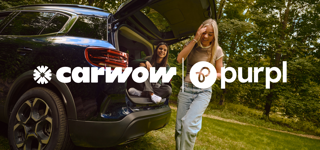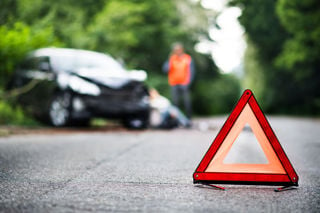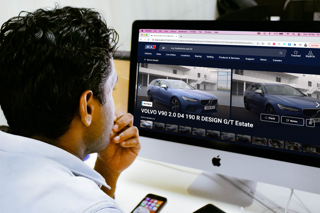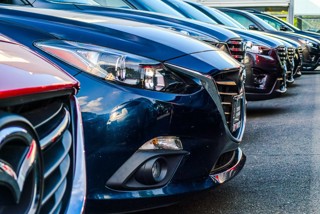By Tim Rose and Richard Yarrow
Need to know
- Time, efficiency and logistics contribute most significantly to dealers’ used car operational costs after refurbishment expenses
- Technology will allow dealers to auction trade-ins without the car leaving the dealer’s compound
- Accurate valuations for trade-ins can aid dealers’ cashflow
The UK’s motor auction and remarketing sector is the most advanced in Europe.
In the UK, where a professional motor auction industry and a regular car change cycle fixation has existed for some time, used car sales per 1,000 people are around the 110 mark, twice that of Italy and three times that of Spain.
But handling the trade-in requires process and cost. It is how dealers optimise that process that can bring benefits to the bottom line.
BCA, which has 19 auction locations, is about to launch new mobile technology which will allow dealers who auction their trade-ins to digitally offer a car for sale without it leaving the dealership.
BCA said this will enable it to service the smaller franchised dealers and independents who have found it too costly to send part-exchanges to auction because of the low volumes.
Commercial director D’Vidis Jacobs said in remarketing moving the car from one location to the auction compound is one of the biggest costs. He predicted the motor auction market “moving more online in the longer term”, with increased numbers of vehicles sold directly from off-site locations. However, he didn’t see BCA not requiring its current infrastructure and physical footprint at any point.
Alongside its Live Online service which allows buyers to take part in the real-time action at a physical auction via the internet, BCA also has E-auction, a purely online trade sale of vehicles all with images and detailed appraisals. Volumes in this area have risen dramatically, from 2,416 units in Q1 2007 to 32,772 units in Q1 2012, some from off-site locations, with all vehicles delivered to the purchasers. More than 2,500 trade buyers participate in E-auction monthly.
Coupled with its new Appraise, Value and Sell system, which aims to help dealers set a part-exchange value on a car more accurately and efficiently using a tablet PC, online sales can help dealers significantly.
The system creates a paperless record, allows all managers in a dealer group to see when a trade-in has been received, in case they wish to keep it for retail, otherwise the dealer can choose to auction the car online to the trade or arrange collection for physical sale.
Jacobs said it creates an opportunity to take a larger share of the business – it wants to tap into smaller businesses, bring more dealers and direct owned fleets on board and sell and transport more vehicles for them.
But it won’t be offering online auctions to private buyers because of the Distance Selling Regulations which could lead to a car being returned a week after the sale.
Gavin Smith, director Dealer-Auction, said: "The benefits to franchised dealers of offering their trade cars online are quite considerable. Not only are their substantial cost savings to be made but the online proposition gives the selling dealer far more control of the vehicle sale.
"The profits that dealers are seeing from going online with their trade cars are also very attractive."
Essex Auto Group has been offering its used cars to online trade buyers without moving stock from the forecourt. Its partner is Autorola, the online business to business remarketing company.
The group adopted Autorola’s system to help shift its ageing stock, and improve used vehicle stock turn, particularly in the high volume part-exchange plate-change months.
Deputy managing director Mike Brown said: “The system makes disposal of unwanted stock more cost effective.
“By putting vehicles on Autorola’s dealer feed, it is automatically up for sale and can be viewed by thousands more online buyers, while remaining on our forecourt.
“Another benefit is that we are in control of prices, so if we think a price is too low, we can refuse the sale. A fully detailed description of each vehicle further ensures a prompt sale.”
Jon Mitchell, Autorola’s business development manager, said online remarketing of trade-ins or duplicate stock can typically save dealers £100 to £200 of cost of transporting and waiting for physical auction. Leaving the car at the dealership also gives the dealer a chance to retail it.
Manheim, which operates 17 UK auction houses, recently revealed its Simulcast Everywhere digital solution at the NADA Show in the USA. It enables the auction, vehicles and buyers all to be located anywhere. A still picture of the vehicle is displayed with a live audio stream of the auctioneer. A vehicle bid log keeps sale activity up-to-date. In addition, general vehicle details, access to condition reports and the full run list of vehicles are available onscreen.
Manheim said the system’s introduction to the UK is dependent on vendor demand, unlike the Sim-ulcast online system which allows dealers to buy online from auctions.
Seller Advance is Manheim’s solution to assist dealers in the part-exchange valuation process. It uses real time data and condition reporting to assess a vehicle’s value before storing the report and, if required, entering the vehicle to the auction process.
The full valuation is advanced to the vendor ahead of the actual sale to aid the dealer’s cashflow. Funds are then reconciled post sale. Launched in May 2009, it will provide 100,000 valuations by the end of this year from around 250 dealers, said Manheim. It’s now attracting attention from larger dealer groups, rather than the smaller operators it was initially set up to serve.
Daren Wiseman, Manheim’s general manager of valuation services, said Seller Advance was designed to overcome some of the objections that smaller dealers have to auctions.
He believes there’s a lack of expertise in valuing part-exchange vehicles because just identifying the model from the guide books can be hard enough. The Manheim syst- em uses VRMs to correctly identify the car.
He also thinks there’s no limit to the system’s growth.
Seller Advance pushed 8,000 cars to auction in 2011. That has already doubled this year, and Wiseman expects 40,000 by the end of 2014. The valuation-to-auction conversion rate remains constant at around 20%.






















Login to comment
Comments
No comments have been made yet.